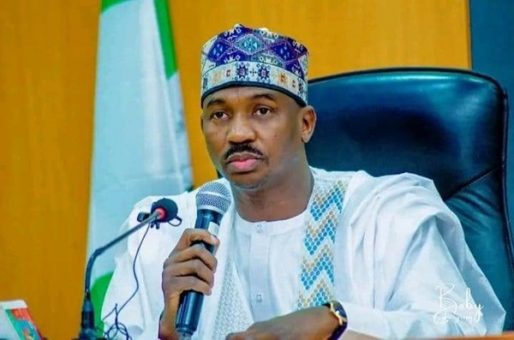Governor Aliyu’s Two Years of Alleviating Poverty
According to Africa’s preeminent, venerable sage Nelson Mandela, “Overcoming poverty is not a gesture of charity. It is the protection of a fundamental human right, the right to dignity and a decent life.” His towering Asian peer Mahatma Gandhi validated and reinforced this insight by proclaiming that “Poverty is the worst form of violence.”
In taking bold actions to give meaning and fundamentally domesticate solutions to these compelling, gripping insights, youthful Governor Ahmed Aliyu of Sokoto State has, not surprisingly, registered significant milestones in pushing back the scourge of poverty in the Seat of the Caliphate.
Shortly after assumption of office, Governor Aliyu birthed the Ministry of Skills Acquisition and Entrepreneurship Development to create jobs for the unemployed youths in the state in a holistic manner. It’s the responsibility of the newly established ministry to design, develop, and implement skills acquisition programs for the youths across the 23 local government areas of Sokoto State and to nurture talents, startups, SMEs, and entrepreneurs across all the 244 wards in the state.
Honorable Abba Muhammad, pioneer commissioner of the Ministry of Skills Acquisition and Entrepreneurship Development, provided some insight into how important poverty alleviation and, concomitantly, the ministry are to Governor Aliyu.
His words: “His Excellency, Governor Ahmad Aliyu Sokoto has never hidden his desire about giving the youths a future; he doesn’t believe in hand-outs. There is nobody in the state that is surprised that the governor, who was once the Commissioner of Social Welfare under our father and leader, Senator Aliyu Magatakarda Wamakko, created this ministry. Governor Aliyu knows how important this ministry is, which is why he wasted no time creating it. And with him solidly behind me, I don’t envisage any problem delivering on the mandate of the ministry.”
What is the nitty-gritty of Governor Aliyu’s poverty alleviation program? Recently 500 women trainees graduated from the state’s poverty reduction program. Drawn from various local government areas, the women have been equipped with valuable skills in leather and crafts, soap making, food and spice production, tamowa production, and hairdressing. Through this training, the Sokoto State Government aims to foster self-reliance and entrepreneurship among women, enabling them to contribute meaningfully to the local economy.
Significantly, beyond empowerment, the program also strengthens the social fabric of communities by reducing dependency and encouraging innovation and stability. The empowerment also covered diverse trades tailored to meet local market demands and individual interests. The skills offered included tailoring and fashion design, shoe and leather works, auto mechanics, welding and fabrication, air conditioner repair, freezer and refrigeration repair, and Vaseline and soap making.
To ensure the sustainability and immediate take-off of the beneficiaries’ ventures, the government not only provided intensive training but also supplied essential start-up equipment and tools free of charge. This vital support is expected to boost the economic capacity of youths across urban and rural communities.
Speaking during the distribution ceremony, Governor Ahmad Aliyu reiterated his administration’s commitment to creating job opportunities and enhancing human capital development, stressing that youth empowerment remains a top priority in his administration’s developmental agenda.
“When you equip people with skills, you’re not just providing them with tools for survival; you’re giving them the ability to create wealth and uplift others,” Dr. Amina Jibril, a prominent Nigerian development economist, accurately observed. “Empowerment programs (like the Sokoto State model) are crucial for breaking the cycle of poverty. By focusing on women and youth, the state is building a more resilient and self-sustaining economy,” Bill Gates recently noted.
Sokoto State’s empowerment approach is, not surprisingly, becoming apparent. Many recipients of the program’s positive deliverables have birthed small businesses already, created jobs, and added value to their families, communities, and the Sokoto society at large. According to an elated graduate of the soap-making training, Halima Yusuf, “Before this program, I had no source of income. Now, I not only make and sell soap but also train other women in my neighborhood. This initiative has changed my life positively.” There is more.
The Sokoto State chief executive’s firm obligation to poverty reduction transcends skills acquisition. The state government recently distributed 1,000 motorcycles and 500 tricycles at subsidized rates, providing affordable transportation and new income-generating opportunities. The intervention is in consonance with the state’s holistic approach to economic development, addressing both employment and mobility needs.
It is also important to accurately distill the further essence of the program, which is two-fold. Not only does it reduce poverty, it also ensures the expedient movement of goods and services. It also births a more accessible and efficient transportation network and upscales the state’s trade and connectivity, further powering economic activity.
Further, the Sokoto State’s poverty reduction program prioritizes health care and social welfare and continuously strives to improve access to quality health care services, particularly for vulnerable populations. This includes expanding health care infrastructure, ensuring the availability of essential medicine, and promoting preventive health care practices.
Additionally, it strengthens social safety needs to provide support for the most marginalized, including elderly persons with disabilities and children.
As the world scales up exertions to achieve the Sustainable Development Goals (SDGs), initiatives like Governor Aliyu’s poverty mitigation program offer a blueprint for inclusive development. Addressing the root causes of poverty while simultaneously equipping citizens with the tools for self-reliance ensures the state is contributing to the global agenda of ending poverty and promoting decent work and economic growth.
Just a fortnight ago, giving a scientific tweak to its poverty alleviation game plan, the Sokoto State Government approved the implementation of a Multidimensional Poverty Index (MPI) Survey across the state, which started June 19 and ended July 9, 2025. The exercise targeted harvesting comprehensive data to inform policy and drive interventions aimed atthe fight against poverty.
The approval was given by Governor Ahmad Aliyu, who described the initiative as a strategic partnership with Redwire Marketing Consulting. The MPI Survey focused on critical areas such as education, healthcare, employment, standard of living, and access to essential services. By examining these indicators, the survey sought to offer a holistic understanding of the poverty situation in Sokoto State, especially at the household level.
According to Governor Aliyu, the exercise aligns with his administration’s 9-Point Smart Agenda, particularly in the areas of security, economic development, education, healthcare, and youth empowerment. “This is a strategic move to address the root causes of deprivation with precise, data-driven policies,” he clarified.
Cut to the bone, Governor Aliyu’s two-year exertions to reduce poverty in Sokoto State have scored considerable milestones, and these templates can also be cloned by the larger Northern region to effectively change the region’s unflattering poverty story.
Louis Achi writes from Abuja.

